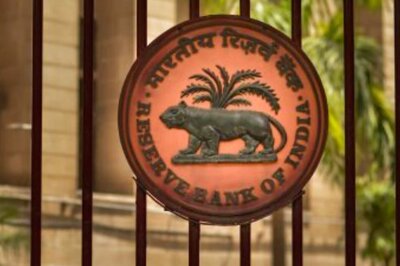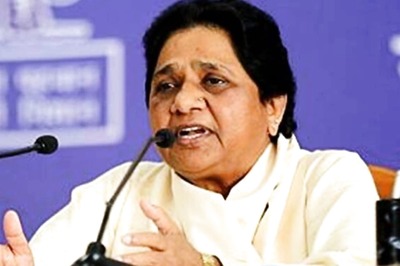
views
Sonia Gandhi on the road through the jungles of Chattisgarh and the dusty plains of UP and Bihar was seen to sharply contrast with the hi-tech, computer-controlled campaign of the NDA. She was the saviour of the aam admi (common man), the NDA under Vajpayee was branded the party of the super-rich.
Aam aadmi versus India Shining was a dichotomy that partly worked: at least it saved the Congress from the embarrassment of being a double digit national party. Even better for Mrs Gandhi, the BJP's abandoning of the coalition dharma meant that the Congress was able to lead a government at the Centre. When she then chose to relinquish the offer of prime ministership, the transition from "videshi bahu" (foreigner daughter-in-law) to "desi goddess" was almost complete. The cult of renunciation was seen as her ultimate triumph.
Three years later, Mrs Gandhi finds the halo slowly being erased, the party defeats in the Maharashtra municipal elections, Punjab and Uttarakhand only the latest wound on the carefully crafted Sonia image. From being the glue which held the Congress together, she is now seen as the remote leader unable to manage factional politics (note how in Uttarakhand, Congress chief ministerial aspirants refused to share a platform). From being seen as the charismatic mascot of her party, she is now being seen as a leader unable to guarantee success. From being projected as a "devi" (goddess) of sacrifice, she now is accused of having an Indira Gandhi-like dictatorial streak. And from being perceived as a stickler for propriety, she now even finds herself being haunted yet again by the charges of protecting the corrupt.
At one level, to attribute the Congress's recent woes to Mrs Gandhi would be terribly unfair. If the Congress has lost in Punjab and Uttarakhand, it isn't the UPA at the Centre, as much as the state leadership which is responsible for the defeats. The fact is that both Amarinder Singh and Narain Dutt Tewari were never going to buck the anti-incumbency phenomenon. Amarinder may have shown some reformist zeal, especially in the last 12 months of his tenure, but the fact is that he was at the end of the day the Raja of Patiala, a feudal autocrat, increasingly disconnected from his party cadres and large sections of the electorate. Tewari too, like Amrinder, was a committed reformist chief minister, but reciting the mantra of reform is not enough to win elections. New economics demands a new political culture. A chief minister in modern-day India cannot be seen as someone trapped in the "lal batti" culture, a politician who relishes the trappings of power without appreciating the need to also address the rising expectations of his electorate. In that sense, both Amarinder and Tewari were cut off from the urges of a more demanding voter, who needs to feel that the men at the top are not prisoners of a small coterie. As for the Maharashtra municipal elections, if the Congress and the NCP local leadership has still not realised the need for electoral alliances, then they need to be politically electrocuted.
Equally, to attribute electoral defeats to the dimming of Mrs Gandhi's charisma would be again a misreading of the mandate. That Mrs Gandhi is a charismatic leader is more a claim than a time-tested attribute. Frankly, no single election has been won or lost on the so-called Sonia factor. The days of the charismatic individual with a pan-Indian appeal who can completely "personalise" an election campaign are over. The BJP tried it by projecting Atal Behari Vajpayee as the "man India awaits" and failed. The Congress had even less of a chance with Sonia Gandhi. Elections in this country are increasingly highly competitive, localized battles, fought on "municipal issues", be it water pumps or road conditions. Even the BJP appears to have recognized this, one reason why in the aftermath of their victories in two north Indian states, the party has refrained from calling this a victory for Hindutva.
Then there is the Quattrocchi factor. Again, Mrs Gandhi could well demand the benefit of doubt. Where is the direct evidence that she has in any away influenced the case of the accused in the Bofors? Is the fact that the Gandhis were friends of the Quattrocchis reason enough to believe the worst? In the 20 years since the Bofors case first came on the national map, this country has had eight prime ministers, including Rajiv Gandhi. Not all of them were "friendly" to the Congress, and yet Quattrocchi has got away each time. Can Sonia Gandhi be held singularly responsible for what really is the shameful collective failure of the entire Indian state machinery?
Unfortunately, politics is as much about perception as it is about reality. When the CBI chooses not to disclose Quattrocchi's detention for a full fortnight, the perception is that the Centre has something to hide. Even Dr Manmohan Singh's statement that the government will not interfere with the due process of the law is seen as too little, too late. Integrity too has to be constantly tested at the bar of public perception. Likewise, Mrs Gandhi's silence on the Q question invariably will be seen as an unwillingness to confront a searching examination.
The Q storm may well pass: turbulence in Parliament is no longer a sign of a more permanent disaster. The deeper crisis that faces the Congress goes beyond scandal or even recent election defeats (in 2008 expect the anti-incumbency syndrome to hit the BJP). The fact is that the party of the freedom movement is increasingly directionless and unable to come up with new ideas for the twenty first century. Aam aadmi was not an idea, it's a slogan, and slogans no longer guarantee election victory. While the more capable Congress leaders have shifted to either government or become chief ministers, the party organisation is left with a handful of netas, some of whom would struggle to win a panchayat election and are looking to make a backdoor entry into Parliament through the Rajya Sabha.
Somehow, the Congress confused the fractured 2004 verdict as a mandate for itself (much as the Left saw it as allowing it to wield power without responsibility). What the verdict in fact did was to merely paper over the cracks that had deepened in the Congress machine over the years. That organisationally the party has weakened, that channels of communication have been limited, that power brokers have replaced mass leaders is a reality that the Congress has to come to terms with. The ham-handed attempt to impose Presidents Rule in Uttar Pradesh suggests an arrogance of power that has no place in contemporary politics. The Congress today is in power on its own in just two of the smaller north Indian states: Himachal Pradesh, Haryana (and the city of Delhi). The road to recovery is a long one, and there are serious questions whether the Congress has the appetite to travel it. For starters, Mrs Gandhi (with Rahul in tow) needs to hit the road again in Uttar Pradesh. Elections are not won in drawing room machinations, but in the heat and dust of real India. You need to rediscover your inner voice again Mrs Gandhi.About the AuthorRajdeep Sardesai Rajdeep Sardesai was the Editor-in-Chief, IBN18 Network, that includes CNN-IBN, IBN 7 and IBN Lokmat. He has covered some of the biggest stories in I...Read Morefirst published:March 02, 2007, 10:08 ISTlast updated:March 02, 2007, 10:08 IST
window._taboola = window._taboola || [];_taboola.push({mode: 'thumbnails-mid-article',container: 'taboola-mid-article-thumbnails',placement: 'Mid Article Thumbnails',target_type: 'mix'});
let eventFire = false;
window.addEventListener('scroll', () => {
if (window.taboolaInt && !eventFire) {
setTimeout(() => {
ga('send', 'event', 'Mid Article Thumbnails', 'PV');
ga('set', 'dimension22', "Taboola Yes");
}, 4000);
eventFire = true;
}
});
window._taboola = window._taboola || [];_taboola.push({mode: 'thumbnails-a', container: 'taboola-below-article-thumbnails', placement: 'Below Article Thumbnails', target_type: 'mix' });Latest News
If a week is a long time in Indian politics, then three years must seem like an eternity. It was, after all, three years ago this month that Sonia Gandhi finally decided to cut through the cloistered confines of 10 Janpath and become a politician in the true sense of the term. That is when she took charge of the UPA campaign, cemented alliances with adversaries like Sharad Pawar, and even decided to embark on roadshows that finally brought her in direct contact with the Great Indian Masses.
Sonia Gandhi on the road through the jungles of Chattisgarh and the dusty plains of UP and Bihar was seen to sharply contrast with the hi-tech, computer-controlled campaign of the NDA. She was the saviour of the aam admi (common man), the NDA under Vajpayee was branded the party of the super-rich.
Aam aadmi versus India Shining was a dichotomy that partly worked: at least it saved the Congress from the embarrassment of being a double digit national party. Even better for Mrs Gandhi, the BJP's abandoning of the coalition dharma meant that the Congress was able to lead a government at the Centre. When she then chose to relinquish the offer of prime ministership, the transition from "videshi bahu" (foreigner daughter-in-law) to "desi goddess" was almost complete. The cult of renunciation was seen as her ultimate triumph.
Three years later, Mrs Gandhi finds the halo slowly being erased, the party defeats in the Maharashtra municipal elections, Punjab and Uttarakhand only the latest wound on the carefully crafted Sonia image. From being the glue which held the Congress together, she is now seen as the remote leader unable to manage factional politics (note how in Uttarakhand, Congress chief ministerial aspirants refused to share a platform). From being seen as the charismatic mascot of her party, she is now being seen as a leader unable to guarantee success. From being projected as a "devi" (goddess) of sacrifice, she now is accused of having an Indira Gandhi-like dictatorial streak. And from being perceived as a stickler for propriety, she now even finds herself being haunted yet again by the charges of protecting the corrupt.
At one level, to attribute the Congress's recent woes to Mrs Gandhi would be terribly unfair. If the Congress has lost in Punjab and Uttarakhand, it isn't the UPA at the Centre, as much as the state leadership which is responsible for the defeats. The fact is that both Amarinder Singh and Narain Dutt Tewari were never going to buck the anti-incumbency phenomenon. Amarinder may have shown some reformist zeal, especially in the last 12 months of his tenure, but the fact is that he was at the end of the day the Raja of Patiala, a feudal autocrat, increasingly disconnected from his party cadres and large sections of the electorate. Tewari too, like Amrinder, was a committed reformist chief minister, but reciting the mantra of reform is not enough to win elections. New economics demands a new political culture. A chief minister in modern-day India cannot be seen as someone trapped in the "lal batti" culture, a politician who relishes the trappings of power without appreciating the need to also address the rising expectations of his electorate. In that sense, both Amarinder and Tewari were cut off from the urges of a more demanding voter, who needs to feel that the men at the top are not prisoners of a small coterie. As for the Maharashtra municipal elections, if the Congress and the NCP local leadership has still not realised the need for electoral alliances, then they need to be politically electrocuted.
Equally, to attribute electoral defeats to the dimming of Mrs Gandhi's charisma would be again a misreading of the mandate. That Mrs Gandhi is a charismatic leader is more a claim than a time-tested attribute. Frankly, no single election has been won or lost on the so-called Sonia factor. The days of the charismatic individual with a pan-Indian appeal who can completely "personalise" an election campaign are over. The BJP tried it by projecting Atal Behari Vajpayee as the "man India awaits" and failed. The Congress had even less of a chance with Sonia Gandhi. Elections in this country are increasingly highly competitive, localized battles, fought on "municipal issues", be it water pumps or road conditions. Even the BJP appears to have recognized this, one reason why in the aftermath of their victories in two north Indian states, the party has refrained from calling this a victory for Hindutva.
Then there is the Quattrocchi factor. Again, Mrs Gandhi could well demand the benefit of doubt. Where is the direct evidence that she has in any away influenced the case of the accused in the Bofors? Is the fact that the Gandhis were friends of the Quattrocchis reason enough to believe the worst? In the 20 years since the Bofors case first came on the national map, this country has had eight prime ministers, including Rajiv Gandhi. Not all of them were "friendly" to the Congress, and yet Quattrocchi has got away each time. Can Sonia Gandhi be held singularly responsible for what really is the shameful collective failure of the entire Indian state machinery?
Unfortunately, politics is as much about perception as it is about reality. When the CBI chooses not to disclose Quattrocchi's detention for a full fortnight, the perception is that the Centre has something to hide. Even Dr Manmohan Singh's statement that the government will not interfere with the due process of the law is seen as too little, too late. Integrity too has to be constantly tested at the bar of public perception. Likewise, Mrs Gandhi's silence on the Q question invariably will be seen as an unwillingness to confront a searching examination.
The Q storm may well pass: turbulence in Parliament is no longer a sign of a more permanent disaster. The deeper crisis that faces the Congress goes beyond scandal or even recent election defeats (in 2008 expect the anti-incumbency syndrome to hit the BJP). The fact is that the party of the freedom movement is increasingly directionless and unable to come up with new ideas for the twenty first century. Aam aadmi was not an idea, it's a slogan, and slogans no longer guarantee election victory. While the more capable Congress leaders have shifted to either government or become chief ministers, the party organisation is left with a handful of netas, some of whom would struggle to win a panchayat election and are looking to make a backdoor entry into Parliament through the Rajya Sabha.
Somehow, the Congress confused the fractured 2004 verdict as a mandate for itself (much as the Left saw it as allowing it to wield power without responsibility). What the verdict in fact did was to merely paper over the cracks that had deepened in the Congress machine over the years. That organisationally the party has weakened, that channels of communication have been limited, that power brokers have replaced mass leaders is a reality that the Congress has to come to terms with. The ham-handed attempt to impose Presidents Rule in Uttar Pradesh suggests an arrogance of power that has no place in contemporary politics. The Congress today is in power on its own in just two of the smaller north Indian states: Himachal Pradesh, Haryana (and the city of Delhi). The road to recovery is a long one, and there are serious questions whether the Congress has the appetite to travel it. For starters, Mrs Gandhi (with Rahul in tow) needs to hit the road again in Uttar Pradesh. Elections are not won in drawing room machinations, but in the heat and dust of real India. You need to rediscover your inner voice again Mrs Gandhi.



















Comments
0 comment